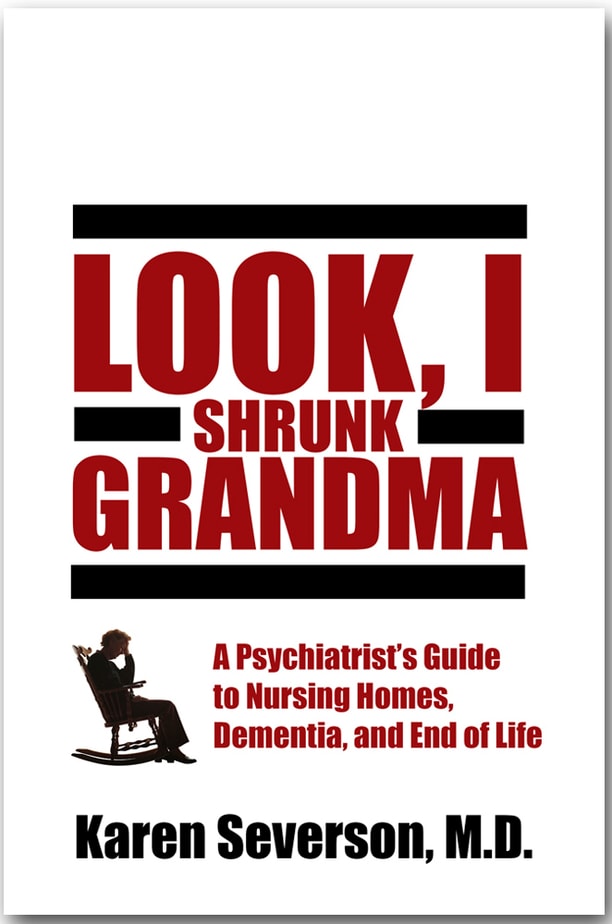This book has been in my head for years. It started with the constant frustration of being caught in the middle of disagreements between nursing homes and families. Sent as a representative of the nursing home to address aggressive behaviors, nurses would relate to me how horrible and dangerous the person with dementia was acting. People were getting injured and care was not able to be performed. I would speak to the families and they were angry with the homes. “They are trained to handle these problems. Why do you need medications?” The families felt the homes were medicating for staff convenience.
In the heat of these situations, it was difficult to explain all the medications I have available and all the factors going into my decisions. The nursing home staff would come to me saying the families just didn’t understand or acted unreasonable. Families were upset no one was taking the time to understand their parent. There were several families who still had not even accepted their loved one had dementia. How was I going to explain the many facets of dementia in a way to make it clear? I always wished I had a book that I could hand to people, so everyone involved could understand both sides of the issue. Instead of homes and families in perpetual battles, I wanted us to all be on the same team. In this way, the person struggling with dementia is provided the best care possible.
My other motivation for writing Look, I Shrunk Grandma, a Psychiatrist’s Guide to Nursing Homes, Dementia and End of Life came from seeing persons with dementia suffering. Many families cling to a natural denial that dementia is terminal. As a result, they ask for medical procedures that could prolong life, but may also inadvertently cause more suffering. When stopping numerous interventions were suggested, we have been accused of being heartless or cruel, allowing someone to die. With the experience from my mother’s death, I wanted to do what I could to decrease end-of-life suffering. Modern medicine has become a curse and a blessing. We need to help people understand its limitations. Unless they understand these limitations, it is unfair to expect them to make the best decisions for their families. Most people don’t have a medical background and feel overwhelmed.
Look, I Shrunk Grandma is newly released, but the feedback has been positive. Nurses reading the book say that they finally feel understood. Part of the book discusses why I feel people have trouble letting loved ones go into hospice care. The families that have read this have felt less guilty in doing so, as well as better able to make informed decisions.
Lastly, I had to write with humor. I find it incredibly hard to read about such difficult subjects and felt humor would make it easier.
 About the Author
About the Author
I am a country girl born in Indiana, but moved to Hartford, Connecticut for my father’s work in the insurance industry. My parents threw me and my siblings outside with a ball all day to keep us out of their hair. As a result, I grew up loving sports and entered Ithaca College to pursue a Physical Education degree. My chemistry teacher told me I had a great memory and suggested I go to medical school. I took my great memory to University of Connecticut and later Brown University to study psychiatry. I always knew I loved the mixture of the mind and the body and had to go into Geriatric Psychiatry. I later completed a fellowship in Geriatric Psychiatry at Albert Einstein.
Despite being a psychiatrist, I act more like a pediatrician, as I love to laugh and do it often. I find it hard to be serious. Today I live in Florida and enjoy time with my family. I still play a ton of sports, but get injured way too often. I now work in the addiction field trying to save young lives. Maybe I will write about that someday as well.




7 Responses
This book looks important. I lost my mother (and her mother) to Alzheimer’s, which I wrote about in my. memoir TANGLES AND PLAQUES: A MOTHER AND DAUGHTER FACE ALZHEIMER’S. And I lost my father, brother, aunt and uncle to cancer. In all of these situations I was blessed to have medical professionals who understood about quality of life and were able to help me through the tough end-of-life decisions, for which I am so grateful. I think your book might be the help that many people need.
Thank you, I agree that you need advice from medical staff , but also helps to understand the illness and how it’s managed in the nursing homes . It helps make that hard decision when to start palliative care . I saw too many stuck on feeding tubes with no quality , it broke my heart
Thanks for sharing your stories.
Thank you so much for your interest
When I got the call from the rehab facility where my mother was receiving physical therapy, they told me she was threatening people with knives and had to be subdued or removed for everyone’s safety. Before I could get there, the police brought her to the ER of a local hospital. My 4’10, 82 year old mother was a geriatric delinquent. The behavior was hard enough to comprehend, but the reaction seemed a little excessive to me at the time. But once I understood the paradigm better, I got it. these situations are extremely trying on everyone involved. Having a resource to guide people through is invaluable.
Yes I have been called so many times to these emergencies , they are horrible . Nursing homes and ALFs do not warn you that in a behavioral emergency they can be transferred to psychiatric units . I felt the need to explain all the meds , what they treat and how nursing homes work to navigate these emergencies . You handled it well from what I can see , many times families are understandably angry or refuse to allow any psych medications
Mom spent weeks in a psych hospital. When I learned about the medications they were using, it upset me. The warnings about the dangers are scary as hell. But what I came to realize was, if I wanted my mother to have quality of life in a social setting, I was going to have to accept the prescribed regimen. Her behaviors were managed to a degree, but ultimately, moving her to a smaller setting with fewer residents enabled environmental control of her triggers. She eventually settled in, for a while, anyway.